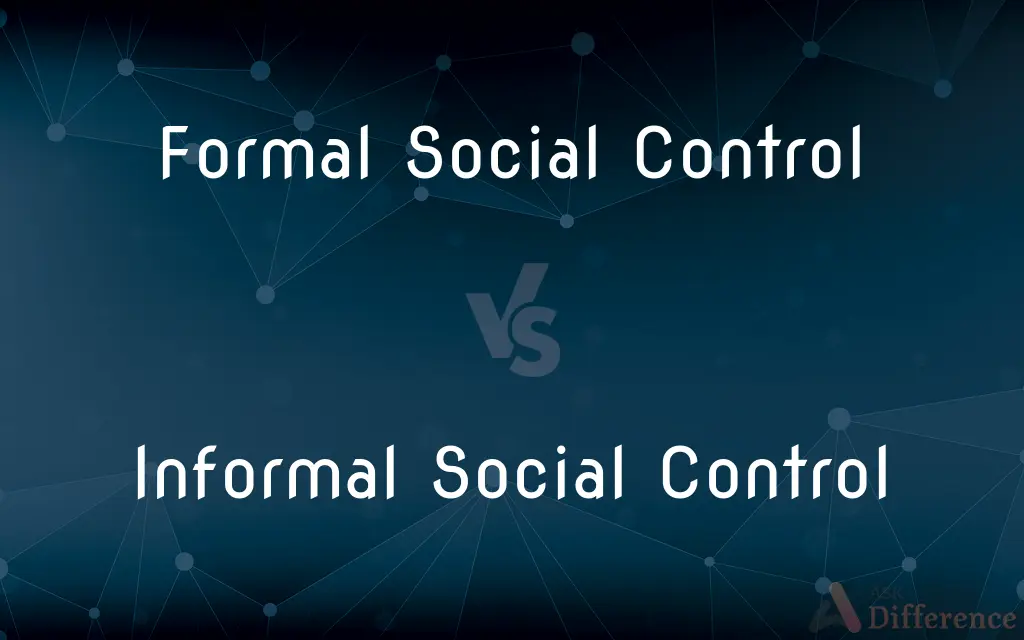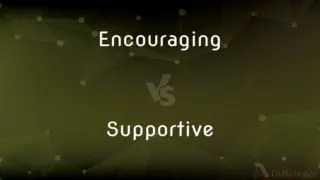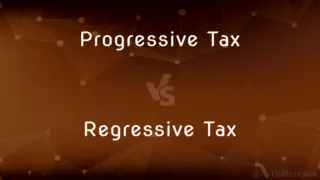Formal Social Control vs. Informal Social Control — What's the Difference?
By Tayyaba Rehman — Published on October 15, 2023
Formal Social Control enforces laws through authorized figures; Informal Social Control operates through norms and informal societal expectations.

Difference Between Formal Social Control and Informal Social Control
Table of Contents
ADVERTISEMENT
Key Differences
In society, Formal Social Control and Informal Social Control play pivotal roles in maintaining order and discipline. Formal Social Control is established by authorized institutions, like law enforcement agencies, courts, and schools, where rules, laws, and regulations are enforced, often involving penalties for non-compliance. Informal Social Control, on the other hand, stems from societal norms, customs, traditions, and values that guide individual behavior, mainly through social pressure, and does not involve legal repercussions.
Formal Social Control is clearly structured and has distinct, predetermined consequences, providing a legal framework within which society operates. It involves tangible, documented rules and is associated with the governance of society to maintain order and regulate conflict. Informal Social Control is less structured and relies on societal or peer pressure, moral and ethical persuasion, and is often enforced by family, friends, or social circles. It helps in creating a societal balance by establishing acceptable behavior patterns.
While Formal Social Control predominantly uses legal systems, like laws, regulations, and policies, to mandate behavior and impose penalties, Informal Social Control is more oriented toward influencing individual behavior through societal expectations, norms, and values, without legal implications. The effectiveness of Formal Social Control is usually measurable, whereas the effectiveness of Informal Social Control can be subjective and variable, depending on individual perceptions and societal norms.
In many societies, Formal Social Control and Informal Social Control coexist and complement each other, collaboratively shaping individuals’ behaviors and maintaining societal harmony. The effectiveness of these controls relies on the societal context, individuals' perceptions, and adherence to both formal regulations and informal norms.
Comparison Chart
Enforcement
Enforced by authorized institutions.
Enforced by society, peers, and family.
ADVERTISEMENT
Structure
Clearly structured with predetermined consequences.
Less structured, more flexible.
Basis
Based on laws, regulations, and policies.
Based on norms, values, and traditions.
Consequences
Legal consequences like fines or imprisonment.
Social consequences like disapproval or ostracism.
Effectiveness
Measurable through legal frameworks.
Subjective and variable, depending on societal norms.
Compare with Definitions
Formal Social Control
Formal Social Control refers to the enforcement of societal norms through authorized and structured institutions.
Laws and regulations are elements of Formal Social Control that maintain order in society.
Informal Social Control
Informal Social Control is enforced by societal circles such as friends, family, and community, influencing individuals’ moral and ethical perspectives.
Cultural traditions are aspects of Informal Social Control that shape individuals’ values and norms.
Formal Social Control
Formal Social Control involves predetermined consequences for non-compliance with established rules.
Violating traffic rules can lead to penalties under Formal Social Control.
Informal Social Control
Informal Social Control operates without legal repercussions, relying instead on social and moral persuasion.
The expectation to greet someone politely is a type of Informal Social Control established by societal norms.
Formal Social Control
Formal Social Control is tangible, involving documented rules and regulations.
Formal Social Control is exemplified by written laws that dictate acceptable behavior within society.
Informal Social Control
Informal Social Control is flexible and less structured, molding individual behavior through societal expectations.
Family upbringing often involves Informal Social Control, instilling values and acceptable behavior patterns.
Formal Social Control
Formal Social Control is associated with governance and operates through legal systems to regulate conflict and maintain order.
The police force is an instrument of Formal Social Control, ensuring public safety and order.
Informal Social Control
Informal Social Control guides individual behavior through societal norms, traditions, and values.
Peer pressure is a form of Informal Social Control, influencing individual choices and behaviors.
Formal Social Control
Formal Social Control provides a legal and structured framework within which society operates.
The judicial system is a pivotal component of Formal Social Control, arbitrating disputes and enforcing laws.
Informal Social Control
Informal Social Control creates societal balance by establishing acceptable behavior patterns without legal implications.
Community disapproval serves as Informal Social Control, discouraging undesirable behavior within societal settings.
Common Curiosities
Can Informal Social Control impose legal penalties?
No, Informal Social Control relies on societal and moral persuasion without legal repercussions.
Are there predetermined consequences in Formal Social Control?
Yes, Formal Social Control involves predetermined legal consequences for non-compliance.
What is Formal Social Control?
Formal Social Control is the enforcement of societal norms and laws through authorized institutions.
Is Informal Social Control flexible?
Yes, Informal Social Control is less structured and more flexible, relying on societal influences.
Can Formal Social Control maintain societal order?
Yes, Formal Social Control regulates behavior and maintains order through legal enforcement.
Do Formal and Informal Social Control coexist?
Yes, they often coexist and complement each other to shape individual behavior and maintain societal harmony.
Can Formal Social Control regulate conflict?
Yes, Formal Social Control operates through legal systems to regulate conflict and maintain societal order.
How does Informal Social Control operate?
Informal Social Control operates through societal norms, values, and expectations without legal enforcement.
Does Formal Social Control have a structured framework?
Yes, Formal Social Control is structured, operating within legal and institutional frameworks.
Is Formal Social Control measurable?
Yes, the effectiveness of Formal Social Control is usually measurable through legal frameworks.
How is Informal Social Control enforced?
Informal Social Control is enforced by peers, family, and society through moral and social persuasion.
Can Informal Social Control be variable?
Yes, Informal Social Control can be subjective and variable, depending on societal norms and individual perceptions.
Is Formal Social Control tangible?
Yes, Formal Social Control is tangible and involves documented laws and regulations.
Can Informal Social Control mold individual behavior?
Yes, Informal Social Control molds individual behavior through societal expectations and norms.
Share Your Discovery

Previous Comparison
Encouraging vs. Supportive
Next Comparison
Progressive Tax vs. Regressive TaxAuthor Spotlight
Written by
Tayyaba RehmanTayyaba Rehman is a distinguished writer, currently serving as a primary contributor to askdifference.com. As a researcher in semantics and etymology, Tayyaba's passion for the complexity of languages and their distinctions has found a perfect home on the platform. Tayyaba delves into the intricacies of language, distinguishing between commonly confused words and phrases, thereby providing clarity for readers worldwide.













































